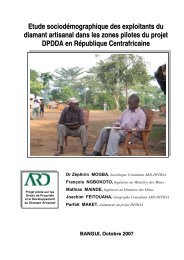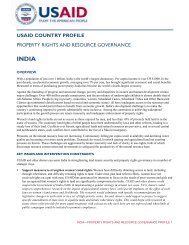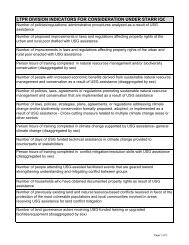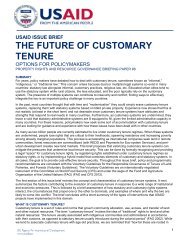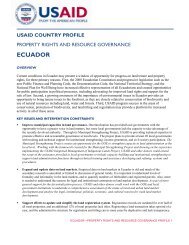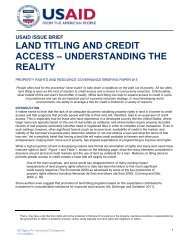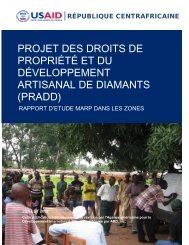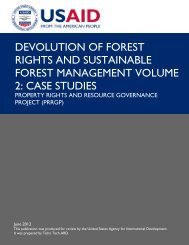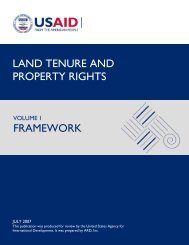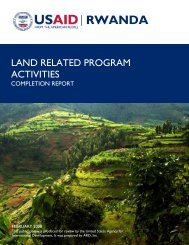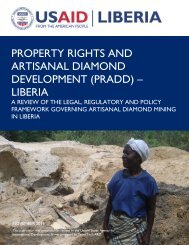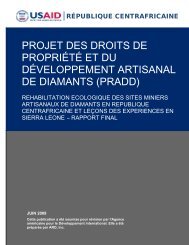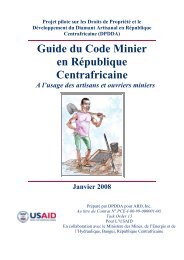achieved by resolv<strong>in</strong>g discrepancies regard<strong>in</strong>g <strong>the</strong> statutory-customary divide <strong>in</strong> <strong>natural</strong> <strong>resource</strong> <strong>management</strong>through adjustment <strong>of</strong> statutory policies. Resolv<strong>in</strong>g such discrepancies <strong>in</strong> favor <strong>of</strong> customary arrangementsthat <strong>resource</strong> users and <strong>rights</strong> holders support, and progressively clarify<strong>in</strong>g rules <strong>of</strong> access to and use <strong>of</strong> landand o<strong>the</strong>r <strong>natural</strong> <strong>resource</strong>s will gradually narrow opportunities for serious disputes over <strong>property</strong> <strong>rights</strong>.Of particular concern <strong>in</strong> <strong>property</strong> <strong>rights</strong> enforcement are transaction costs, <strong>in</strong>clud<strong>in</strong>g costs <strong>of</strong> labor and timeneeded for rule mak<strong>in</strong>g, monitor<strong>in</strong>g compliance and enforc<strong>in</strong>g rules <strong>in</strong> cases <strong>of</strong> <strong>in</strong>fraction. As noted above,<strong>the</strong> characteristic <strong>of</strong> <strong>the</strong> <strong>resource</strong> and terra<strong>in</strong> is an important factor <strong>in</strong> assess<strong>in</strong>g transaction costs. For<strong>in</strong>stance, it is <strong>of</strong>ten easier to monitor harvest<strong>in</strong>g activity on a lake than <strong>in</strong> <strong>the</strong> middle <strong>of</strong> a forest, s<strong>in</strong>ce a s<strong>in</strong>glemonitor can see far<strong>the</strong>r across open water than through forested terra<strong>in</strong>. Fur<strong>the</strong>rmore, stationary <strong>resource</strong>ssuch as <strong>in</strong>dividual trees, v<strong>in</strong>es, and pastures are easier to monitor than mobile <strong>resource</strong>s such as birds <strong>in</strong>forests, fish <strong>in</strong> lakes and streams, and wildlife <strong>in</strong> watersheds, particularly migratory wildlife populations thateasily move across more than one <strong>in</strong>ternational or <strong>resource</strong> border. The more difficult it is to monitor a<strong>resource</strong>, <strong>the</strong> greater <strong>the</strong> risk <strong>of</strong> unauthorized activity and <strong>the</strong> harder (more costly) it is to establish robust<strong>in</strong>stitutional arrangements for monitor<strong>in</strong>g.States with large land hold<strong>in</strong>gs, large expanses <strong>of</strong> privately held lands, open water <strong>resource</strong>s (typically openaccess), and commonly held lands and <strong>natural</strong> <strong>resource</strong>s may be particularly challeng<strong>in</strong>g for <strong>the</strong>se reasons.Where states are responsible for monitor<strong>in</strong>g and enforcement, lack <strong>of</strong> f<strong>in</strong>ances for monitor<strong>in</strong>g and resolv<strong>in</strong>gdisputes is <strong>of</strong>ten a critical obstacle to effective governance. Moreover, such <strong>of</strong>ficial systems <strong>of</strong>ten lend<strong>the</strong>mselves to corruption. Hybrid user/<strong>of</strong>ficial monitor<strong>in</strong>g and enforcement systems frequently prove lesscorrupt and more effective <strong>in</strong> dissuad<strong>in</strong>g or sanction<strong>in</strong>g illicit uses. Individuals hold<strong>in</strong>g private <strong>rights</strong> mayexperience similar problems <strong>of</strong> f<strong>in</strong>ancial constra<strong>in</strong>ts where large extents <strong>of</strong> lands are <strong>in</strong>volved. In many cases,community-based systems for commons <strong>management</strong> have been particularly effective <strong>in</strong> rule enforcement <strong>of</strong>relatively larger land areas, and have proved more effective than state or <strong>in</strong> some cases <strong>in</strong>dividual privatesystems. In common <strong>property</strong> systems, customary practices <strong>of</strong> monitor<strong>in</strong>g and enforcement typically <strong>in</strong>volveshar<strong>in</strong>g responsibility among members. In customary systems, social relations and associated sanctionsprovide strong dis<strong>in</strong>centives to violation <strong>of</strong> rules if monitor<strong>in</strong>g is effective. Fur<strong>the</strong>rmore, perceived legitimacy<strong>of</strong> <strong>the</strong> customary systems lend for greater voluntary compliance, and lower<strong>in</strong>g <strong>of</strong> enforcement costs. Manyprograms <strong>the</strong>refore look to streng<strong>the</strong>n local <strong>in</strong>stitutions <strong>of</strong> governance, and community-based participatoryapproaches to monitor and resolve land and <strong>natural</strong> <strong>resource</strong> related disputes. Such local alternatives are notmore compatible with customary rules and more accessible for local communities, but <strong>the</strong>y ease burden on<strong>the</strong> judicial court systems (FAO, 2002a).Disputes over <strong>resource</strong> use are typically resolved by village <strong>in</strong>stitutions and elected or appo<strong>in</strong>ted authoritiesparticularly where customary rules are <strong>in</strong>volved, and by formal courts <strong>in</strong> cases <strong>of</strong> statutory rule enforcement.Many o<strong>the</strong>r cases <strong>of</strong> disputes over <strong>natural</strong> <strong>resource</strong> use are not brought to court, and may l<strong>in</strong>ger on or beresolved by local councils. Given that <strong>in</strong> some countries, particularly <strong>in</strong> <strong>the</strong> post-conflict contexts as <strong>in</strong>Burundi and Rwanda, disputes over land and <strong>natural</strong> <strong>resource</strong> account for approximately 80-90 percent <strong>of</strong>cases received <strong>in</strong> courts (ACTS 2005), dispute resolution problems should not be taken lightly. In <strong>the</strong>secountries formal court systems are overburdened, with <strong>in</strong>sufficient capacity to handle <strong>the</strong> numerous cases <strong>of</strong>disputes related to land and <strong>natural</strong> <strong>resource</strong>s. A weak enforcement system casts doubt on <strong>the</strong> security <strong>of</strong><strong>property</strong> <strong>rights</strong> and hence engenders dis<strong>in</strong>centives that dissuade people from engag<strong>in</strong>g <strong>in</strong> susta<strong>in</strong>ablepractices.Gambia provides an <strong>in</strong>structive example. This country has made efforts to uphold a comprehensiveenforcement and dispute resolution network that respects customary law throughout <strong>the</strong> country, while at <strong>the</strong>same time advanc<strong>in</strong>g cautiously toward more formal laws and <strong>in</strong>stitutions. The 1990 District Tribunals Actestablished a tribunal for each district <strong>in</strong> <strong>the</strong> country. Each tribunal is presided over by <strong>the</strong> district chief,known as <strong>the</strong> Seyfo, assisted by six or seven local residents whom he nom<strong>in</strong>ates. The district tribunals areempowered to ensure proper application and enforcement <strong>of</strong> customary and religious laws (Marong, 1994,p.7, emphasis is ours). Despite its mandate to base its decisions on customary laws, <strong>the</strong> tribunal courts wouldquickly be overwhelmed if it were not for <strong>the</strong> government-sanctioned and cont<strong>in</strong>u<strong>in</strong>g existence <strong>of</strong> a network28 ROLE OF PROPERTY RIGHTS IN NRM: GOOD GOVERNANCE AND EMPOWERMENT OF THE RURAL POOR
<strong>of</strong> <strong>in</strong>formal enforcement and dispute resolution <strong>in</strong>stitutions that provide <strong>the</strong> bulk <strong>of</strong> dispute resolutionservices <strong>in</strong> Gambia, thus alleviat<strong>in</strong>g <strong>the</strong> workload <strong>of</strong> <strong>the</strong> tribunals. As noted by Marong:Dispute resolution <strong>in</strong> <strong>the</strong> customary sett<strong>in</strong>g is not <strong>the</strong> exclusive doma<strong>in</strong> <strong>of</strong> <strong>the</strong> DistrictTribunal. Several <strong>in</strong>formal systems exist with<strong>in</strong> <strong>the</strong> traditional system which operatesignificantly to curtail <strong>the</strong> number <strong>of</strong> cases that o<strong>the</strong>rwise <strong>the</strong> tribunals would have had tocope with…. These systems are not established by any statute or o<strong>the</strong>r law and <strong>the</strong>reforelack <strong>the</strong> b<strong>in</strong>d<strong>in</strong>g legal force that characterizes <strong>the</strong> operation <strong>of</strong> <strong>the</strong> District Tribunals, yet <strong>the</strong>yhave been so fully and completely accepted by <strong>the</strong> traditional people that <strong>the</strong> effect has beenthat adjudication by <strong>the</strong> more formal judicial system has become a matter <strong>of</strong> last resort andcomes ma<strong>in</strong>ly when <strong>the</strong> <strong>in</strong>formal mechanisms discussed hereunder have failed to work(p.13).The <strong>in</strong>formal dispute resolution <strong>in</strong>stitutions <strong>in</strong>clude family elders, <strong>the</strong> village Alkalo (traditional chief) and <strong>the</strong>local Imam (religious leader). While most disputes are typically resolved at this <strong>in</strong>formal level, <strong>in</strong> cases wheredisputes go beyond <strong>the</strong> <strong>in</strong>formal level to <strong>the</strong> district tribunal, rul<strong>in</strong>gs cont<strong>in</strong>ue to uphold customary laws. Forexample, among <strong>the</strong> pr<strong>in</strong>ciples followed by <strong>the</strong> tribunals is that whenever <strong>the</strong>re is a dispute over ownership <strong>of</strong> land and<strong>the</strong>re are elderly people who know <strong>the</strong> tenure history <strong>of</strong> <strong>the</strong> land, <strong>the</strong>y are called to give evidence before <strong>the</strong> tribunal as to <strong>the</strong>question <strong>of</strong> ownership (p.15), as illustrated <strong>in</strong> <strong>the</strong> example provided <strong>in</strong> Box 11.Box 11. Giv<strong>in</strong>g Legitimacy to Historical EvidenceThe Court attached significant weight to <strong>the</strong> evidence <strong>of</strong> a 90 year old witness who deposed that <strong>the</strong>defendant’s family were <strong>the</strong> orig<strong>in</strong>al clearers <strong>of</strong> <strong>the</strong> land <strong>in</strong> dispute and that he knew that defendant’s fa<strong>the</strong>rcultivated <strong>the</strong> disputed land up to his death and <strong>the</strong>reafter <strong>the</strong> defendant himself farmed it for over 30 years.The Court gave judgment for <strong>the</strong> defendant. This case illustrates not only <strong>the</strong> approach <strong>of</strong> <strong>the</strong> DistrictTribunals to <strong>the</strong> evidence <strong>of</strong> particularly knowledgeable witnesses, but also <strong>the</strong> pr<strong>in</strong>ciple that orig<strong>in</strong>alclear<strong>in</strong>g <strong>of</strong> <strong>the</strong> virg<strong>in</strong> forest confers customary ownership <strong>of</strong> <strong>the</strong> land (Marong, p.15).District tribunals <strong>in</strong> Gambia also have authority to resolve disputes <strong>in</strong>volv<strong>in</strong>g non-land <strong>natural</strong> <strong>resource</strong>s.Often <strong>the</strong> tribunals must weigh established customary rules aga<strong>in</strong>st pr<strong>in</strong>ciples <strong>of</strong> fairness and <strong>in</strong> favor <strong>of</strong>compromise, as illustrated <strong>in</strong> Box 12.Box 12. Disputes Over Ownership <strong>of</strong> Planted TreesDisputes <strong>of</strong>ten arise over ownership <strong>of</strong> planted trees. As <strong>the</strong> Imam <strong>of</strong> Dumbutu related, when a man whohas planted a tree subsequently dies, ano<strong>the</strong>r person (possibly <strong>the</strong> owner <strong>of</strong> <strong>the</strong> land) can assume <strong>the</strong>responsibility <strong>of</strong> water<strong>in</strong>g and car<strong>in</strong>g for <strong>the</strong> tree. If, after some time passes, <strong>the</strong> son <strong>of</strong> <strong>the</strong> man who planted<strong>the</strong> tree claims ownership <strong>of</strong> <strong>the</strong> tree, a dispute may arise <strong>in</strong> which <strong>the</strong> caretaker claims ownership <strong>of</strong> <strong>the</strong>tree. As <strong>the</strong> imam <strong>of</strong> Dumbutu stated, customary law would uphold <strong>the</strong> ownership claim <strong>of</strong> <strong>the</strong> son. The act<strong>of</strong> water<strong>in</strong>g and car<strong>in</strong>g for <strong>the</strong> tree does not confer <strong>rights</strong> <strong>of</strong> ownership over <strong>the</strong> tree. The son <strong>of</strong> <strong>the</strong> treeplanter would <strong>in</strong>herit <strong>the</strong> ownership <strong>rights</strong> to <strong>the</strong> tree (M’Boge and Sheehan, 1995, p. 43).Cont<strong>in</strong>u<strong>in</strong>g challenges rema<strong>in</strong> however as customary systems experience socioeconomic transitions. Thisweakens social relations (and hence social sanctions), gives rise to labor shortages occasioned by male labormigration, and <strong>in</strong> turn poses a serious challenge for many rural communities <strong>in</strong> govern<strong>in</strong>g commonly held<strong>resource</strong>s. Given that local governance systems are <strong>of</strong>ten more effective and efficient, and typically moreadapted to chang<strong>in</strong>g needs aris<strong>in</strong>g from emerg<strong>in</strong>g land and labor markets, <strong>natural</strong> <strong>resource</strong>s markets, andenvironmental <strong>in</strong>itiatives and <strong>in</strong>terventions than are state systems, customary <strong>in</strong>stitutions can be assisted toadjust to <strong>the</strong> scale and methods, and to adapt to <strong>the</strong>se changes. A f<strong>in</strong>al example <strong>of</strong> <strong>the</strong> adaptability andflexibility <strong>of</strong> customary dispute resolution systems also is provided by Gambia (Box 13). This k<strong>in</strong>d <strong>of</strong> equityROLE OF PROPERTY RIGHTS IN NRM: GOOD GOVERNANCE AND EMPOWERMENT OF THE RURAL POOR 29



